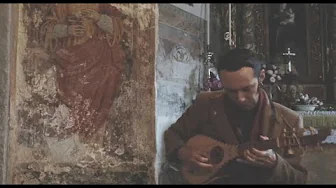Edi beo þu ∾ Edi beo thu hevene quene, medieval Christmas song from 13th cent. played with gittern

Details
| Title | Edi beo þu ∾ Edi beo thu hevene quene, medieval Christmas song from 13th cent. played with gittern |
| Author | MURMUR MORI |
| Duration | 1:10 |
| File Format | MP3 / MP4 |
| Original URL | https://youtube.com/watch?v=qmO2pOy6sOY |
Description
Christmas celebrations were very heartfelt in the so-called Middle Ages, most of the traditions still present in our western society were born right in the medieval centuries, it's no wonder then that there are enough songs about the Holy Mary and the nativity of Christ.
The concept of Christmas was born around the 5th century AD. as Pope Leo I had the intention of replacing the pagan rites of the Saturnalia, celebrations dedicated to Saturn and to Nature falling asleep during Winter; and of Sol Invictus or the Invincible Sun which was reborn at the end of the Winter Solstice, on December 25, a period in which the days begin to lengthen in the planet's northern hemisphere, thus confirming the Sun's reaffirmation over the world.
Leo I in his Christmas sermons states that the "True Sun" is Christ, that is why December 25th becomes the day in which his birth is celebrated, which illuminates the world after the long period of darkness.
Leo I in the fifth century enriches the symbolic imagery of the nativity that is still part of our society today: the ox and the donkey in the stall would represent the pagans and the Jewish people respectively. Subsequently, in the seventh century, the stable present in the Gospels of Luke and Matthew was replaced by the freezing cave present in the Proto-Gospel of James, and this cave is associated with a symbolic prediction of the hardness of life that Jesus will have to face.
All these elements, in the twelfth century, will be taken by St. Francis to represent the birth of Jesus to the people through the nativity scene of Greccio.
The melody played here by Mirko in the oratory of Sant'Antonio in Toceno is called "Edi beo þu hevene quene", dating back to 13th century in praise of the Virgin Mary and composed in Middle English. It expresses familiarity in relationship with Mary and even romantic attachment. Is found in its entirety in a single source, a manuscript found in Llanthony Secunda Priory in Gloucestershire, now classified as Corpus Christi College Oxford 59, dated 1265 circa. The melody's peculiarity is that of using a non-ecclesiastical mode, revealing maybe a popular origin. The lyrics also show an affinity with the courtly love themes and the influence of the troubadours' poetry.
Lyrics:
Edi beo thu, hevene quene
Folkes froure and engles blis
Moder unwemmed and maiden clene
Swich in world non other nis
On thee hit is wel eth sene
Of all wimmen thu havest thet pris
Mi swete levedi, her mi bene
And reu of me yif thi wille is
Thu asteghe so the daiy rewe
The deleth from the deorke nicht
Of thee sprong a leome newe
That al this world haveth ilight
Nis non maide of thine heowe
Swo fair, so schene, so rudi, swo bricht
Swete levedi, of me thu reowe
And have merci of thin knicht
Spronge blostme of one rote
The Holi Gost thee reste upon
Thet wes for monkunnes bote
And heore soule to alesen for on
Levedi milde, softe and swote
Ic crie thee merci, ic am thi mon
Bothe to honde and to fote
On alle wise that ic kon
Thu ert eorthe to gode sede
On thee lighte the heovene deugh
Of thee sprong theo edi blede
The Holi Gost hire on thee seugh
Thu bring us ut of kare of drede
That Eve bitterliche us breugh
Thu sschalt us into heovene lede
Welle swete is the ilke deugh
Moder, ful of thewes hende
Maide dreigh and wel itaucht
Ic em in thine love bende
And to thee is al mi draucht
Thu me sschildghe from the feonde
Ase thu ert freo, and wilt and maucht
Help me to mi lives ende
And make me with thin sone isaught
◇
Murmur Mori's research, instrumentation and musical works are all self-financed, any support is welcome. ♡
To buy our music and support 𝐌𝐮𝐫𝐦𝐮𝐫 𝐌𝐨𝐫𝐢:
http://murmurmori.com/en/shop
http://paypal.me/volpemirko
🌹
#murmurmori #medievalmusic #folk #earlymusic #edibeothu #christmas #noël #italiamedievale #noel #gittern #musicamedievale #troubadour